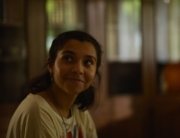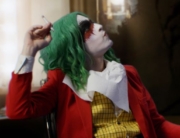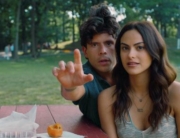
What’s with the recent spate of dark period dramas built around forbidden lesbian love? The burgeoning genre received a good-natured but sharp tweak in the New Yorker—the spot-on parody is here. Now two melancholy tales of love between women (love hidden, denied, or destroyed) arrive in the middle of a long pandemic winter to further depress the prevailing mood.
The Two of Us, France’s Academy Award contender, avoids overt miserablism with some shrewd twists and unpredictable characterization. The World to Come, on the other hand, plunges deep into the murk of despair with barely a breath of relief—this movie makes last year’s sullen Ammonite feel like Xanadu.
“I am a sea of fear, agitation, and want,” reflects an unhappy country housewife. “My mother always said we tumble from one mortification to another,” helpfully muses her husband. The woebegone pensées set the tone for director Mona Fastvold’s grueling march through baneful emotional terrain. Abigail (Katherine Waterston) is grief-stricken after the death of her young daughter, isolated in the 1850s New York countryside, and stymied in her marriage to the aptly named Dyer (Casey Affleck), a terminally depressed farmer.
Abigail pines for change, so it’s no wonder she falls like a ton of cordwood for Tallie (Vanessa Kirby), the seductive flame-haired temptress a few acres over. Headstrong, capricious, and quick-witted, Tallie can be an unreliable object of affection as she maneuvers for the upper hand in the pair’s furtive encounters. Tallie has a vulnerability of her own; while Abigail is merely married to a mope, Tallie’s husband (Christopher Abbott) is a sadist.
Tallie and Abigail are in deep trouble from the start, and we bear their pain because The World to Come is burdened with an endlessly voice-over that shares Abigail’s every unhappy innermost thought without adding any additional shading to a flat, barren landscape of the heart. Already overbearing, the narration commits the additional sin of cheating with the story line.
At one point, Abigail reveals that Dyer tied her to a chair for three days and forced her to take the painkiller laudanum to quell an episode of hysteria. Not only do we not witness such a presumably intense scene, but it is hard to imagine the lethargic Dyer overpowering Abigail or indeed taking much action of any kind but chopping kindling. Leaving the dramatic work up to the voice-over may be the cinematic equivalent of “Let’s not and say we did.”
Waterston brings a bruised sensitivity to her role, while Kirby’s burnished good looks and sassy tone seem to belong to a more contemporary film. The two do their gallant best with a script that has characters declaring their angst with pronouncements such as, “My husband says contentment is a friend he never gets to see” and “With little pride and less hope, we begin the new year.” The film’s end credits run over a folk dirge of keening torment. To paraphrase Oscar Wilde, you’d have to have a heart of stone not to laugh.

Filippo Meneghetti’s Two of Us is not a period piece, but it sometimes feels like one in its initially genteel, bordering-on-claustrophobic portrayal of two bourgeoise semi-elderly women reveling in a longtime secret liaison. What some might interpret as an old-fashioned strain of class prejudice also makes an appearance. However, the film manages to upend expectations with a twist or two that rouse it from potential stagnation.
Madeleine (Martine Chevallier) is the owner of a pair of deep and thoughtful blue eyes that fill the screen for a good deal of the movie’s running time. She enjoys a tender, clandestine relationship with Nina (Barbara Sukowa), the woman who lives across the hall. The couple’s dream is to sell Mado’s apartment and move to Italy, an idea the film plays up with nostalgic Italian pop music.
But when the time comes to tell her not very happily adjusted adult children about the plan, Mado chickens out, provoking a furious emotional outburst from Nina. This, perhaps, is what triggers a stroke that leaves Mado lying on the floor—in an unnerving shot, food burns in a pan as Nina struggles off camera to revive her love. With Mado bedridden, Nina will have to run a gauntlet of family members and caretakers who think her care and solicitude for Mado look strange or even suspicious coming from a mere neighbor.
The narrative could continue its gentle and sorrowful way at this stage, but a couple of tonal shifts kick in. Nina, as it turns out, is no sweet little old lady. Angry and desperate, Nina is not to be trifled with. Sukowa’s unruly hair and Easter Island cragginess also make her a formidable, even frightening, presence. Two of Us ventures into minor-league suspense with scenes of Nina sneaking around Mado’s apartment, trying to evade people she sees as intruders—this woman is willing to run major risks in a conflict that takes the shape of a low-level war with the introduction of an unscrupulous adversary.
Nuances emerge as the conflict escalates. A sympathetic supporting performance by Léa Drucker as Mado’s confused daughter adds a little texture to the movie’s observation of bittersweet family life, here so sadly at cross-purposes with the couple’s desires. Two of Us ends with a sequence set to more beloved Italian pop tunes, generously giving us a semi-happy conclusion, although it took its share of tragedy to arrive there.
Attention film directors: kindly bring us a movie about a lesbian who is out, enjoys the world she lives in, and actually knows how to have a good time.






Leave A Comment